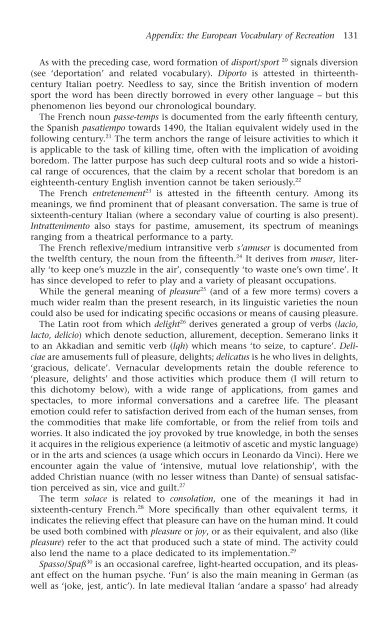Recreation in the Renaissance
Recreation in the Renaissance
Recreation in the Renaissance
- No tags were found...
You also want an ePaper? Increase the reach of your titles
YUMPU automatically turns print PDFs into web optimized ePapers that Google loves.
Appendix: <strong>the</strong> European Vocabulary of <strong>Recreation</strong> 131<br />
As with <strong>the</strong> preced<strong>in</strong>g case, word formation of disport/sport 20 signals diversion<br />
(see ‘deportation’ and related vocabulary). Diporto is attested <strong>in</strong> thirteenthcentury<br />
Italian poetry. Needless to say, s<strong>in</strong>ce <strong>the</strong> British <strong>in</strong>vention of modern<br />
sport <strong>the</strong> word has been directly borrowed <strong>in</strong> every o<strong>the</strong>r language – but this<br />
phenomenon lies beyond our chronological boundary.<br />
The French noun passe-temps is documented from <strong>the</strong> early fifteenth century,<br />
<strong>the</strong> Spanish pasatiempo towards 1490, <strong>the</strong> Italian equivalent widely used <strong>in</strong> <strong>the</strong><br />
follow<strong>in</strong>g century. 21 The term anchors <strong>the</strong> range of leisure activities to which it<br />
is applicable to <strong>the</strong> task of kill<strong>in</strong>g time, often with <strong>the</strong> implication of avoid<strong>in</strong>g<br />
boredom. The latter purpose has such deep cultural roots and so wide a historical<br />
range of occurences, that <strong>the</strong> claim by a recent scholar that boredom is an<br />
eighteenth-century English <strong>in</strong>vention cannot be taken seriously. 22<br />
The French entretenement 23 is attested <strong>in</strong> <strong>the</strong> fifteenth century. Among its<br />
mean<strong>in</strong>gs, we f<strong>in</strong>d prom<strong>in</strong>ent that of pleasant conversation. The same is true of<br />
sixteenth-century Italian (where a secondary value of court<strong>in</strong>g is also present).<br />
Intrattenimento also stays for pastime, amusement, its spectrum of mean<strong>in</strong>gs<br />
rang<strong>in</strong>g from a <strong>the</strong>atrical performance to a party.<br />
The French reflexive/medium <strong>in</strong>transitive verb s’amuser is documented from<br />
<strong>the</strong> twelfth century, <strong>the</strong> noun from <strong>the</strong> fifteenth. 24 It derives from muser, literally<br />
‘to keep one’s muzzle <strong>in</strong> <strong>the</strong> air’, consequently ‘to waste one’s own time’. It<br />
has s<strong>in</strong>ce developed to refer to play and a variety of pleasant occupations.<br />
While <strong>the</strong> general mean<strong>in</strong>g of pleasure 25 (and of a few more terms) covers a<br />
much wider realm than <strong>the</strong> present research, <strong>in</strong> its l<strong>in</strong>guistic varieties <strong>the</strong> noun<br />
could also be used for <strong>in</strong>dicat<strong>in</strong>g specific occasions or means of caus<strong>in</strong>g pleasure.<br />
The Lat<strong>in</strong> root from which delight 26 derives generated a group of verbs (lacio,<br />
lacto, delicio) which denote seduction, allurement, deception. Semerano l<strong>in</strong>ks it<br />
to an Akkadian and semitic verb (lqh) which means ‘to seize, to capture’. Deliciae<br />
are amusements full of pleasure, delights; delicatus is he who lives <strong>in</strong> delights,<br />
‘gracious, delicate’. Vernacular developments reta<strong>in</strong> <strong>the</strong> double reference to<br />
‘pleasure, delights’ and those activities which produce <strong>the</strong>m (I will return to<br />
this dichotomy below), with a wide range of applications, from games and<br />
spectacles, to more <strong>in</strong>formal conversations and a carefree life. The pleasant<br />
emotion could refer to satisfaction derived from each of <strong>the</strong> human senses, from<br />
<strong>the</strong> commodities that make life comfortable, or from <strong>the</strong> relief from toils and<br />
worries. It also <strong>in</strong>dicated <strong>the</strong> joy provoked by true knowledge, <strong>in</strong> both <strong>the</strong> senses<br />
it acquires <strong>in</strong> <strong>the</strong> religious experience (a leitmotiv of ascetic and mystic language)<br />
or <strong>in</strong> <strong>the</strong> arts and sciences (a usage which occurs <strong>in</strong> Leonardo da V<strong>in</strong>ci). Here we<br />
encounter aga<strong>in</strong> <strong>the</strong> value of ‘<strong>in</strong>tensive, mutual love relationship’, with <strong>the</strong><br />
added Christian nuance (with no lesser witness than Dante) of sensual satisfaction<br />
perceived as s<strong>in</strong>, vice and guilt. 27<br />
The term solace is related to consolation, one of <strong>the</strong> mean<strong>in</strong>gs it had <strong>in</strong><br />
sixteenth-century French. 28 More specifically than o<strong>the</strong>r equivalent terms, it<br />
<strong>in</strong>dicates <strong>the</strong> reliev<strong>in</strong>g effect that pleasure can have on <strong>the</strong> human m<strong>in</strong>d. It could<br />
be used both comb<strong>in</strong>ed with pleasure or joy, or as <strong>the</strong>ir equivalent, and also (like<br />
pleasure) refer to <strong>the</strong> act that produced such a state of m<strong>in</strong>d. The activity could<br />
also lend <strong>the</strong> name to a place dedicated to its implementation. 29<br />
Spasso/Spaß 30 is an occasional carefree, light-hearted occupation, and its pleasant<br />
effect on <strong>the</strong> human psyche. ‘Fun’ is also <strong>the</strong> ma<strong>in</strong> mean<strong>in</strong>g <strong>in</strong> German (as<br />
well as ‘joke, jest, antic’). In late medieval Italian ‘andare a spasso’ had already










